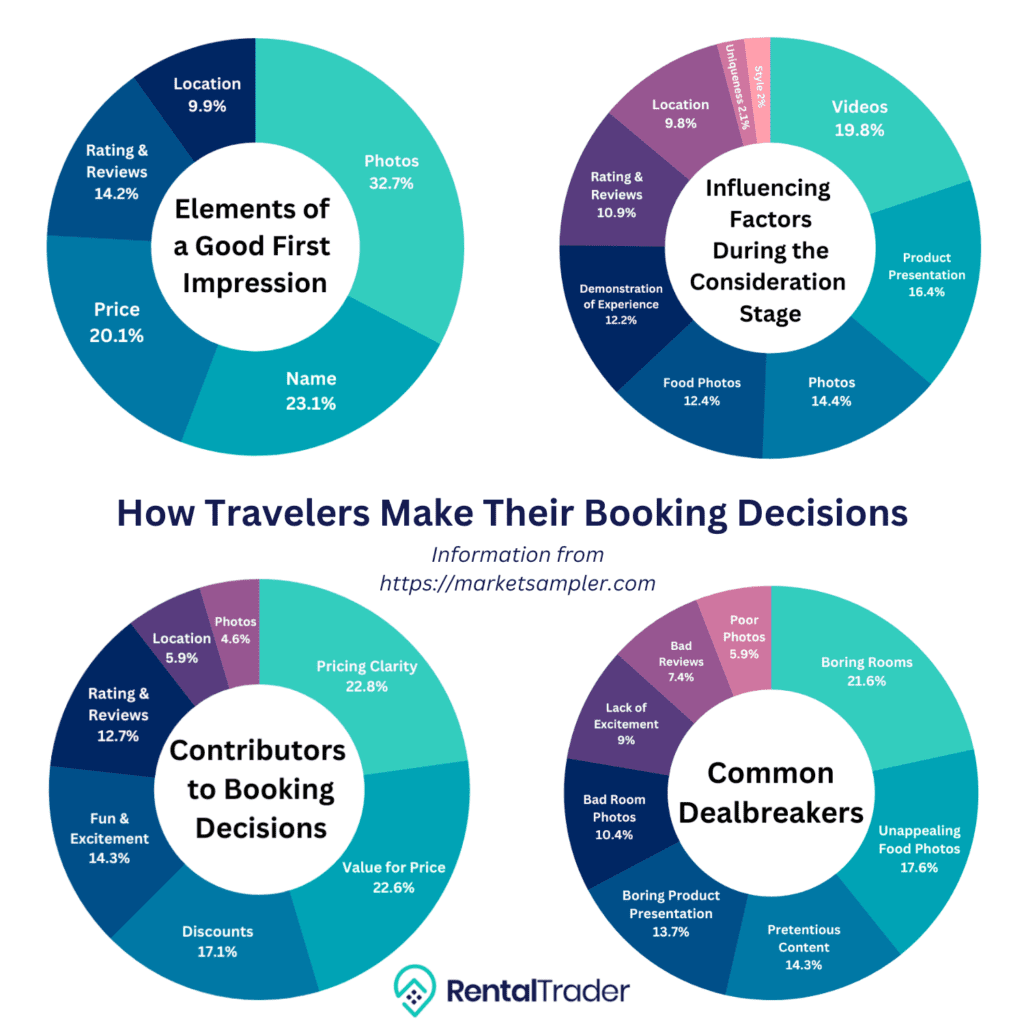
So, you just made the leap and decided to list your property as a vacation rental. Before you can welcome excited travelers to their new home away from home, you need to ensure that your listing stands out from the competition. By following these simple tips, you can showcase your rental property in the best light and boost your views, bookings, and profit!
Contents
Identifying Your Target Audience
One key principle of marketing any product is identifying the target audience. In this case, you have a beautiful property that you wish to offer to travelers. But what kind of travelers do you hope to attract? Once you decide upon a target audience, this will affect many aspects of your marketing. By highlighting features that will appeal to your ideal guest, your listing will stand out among the competition. This is often far more effective than creating a generalized listing and hoping that it appeals to everyone.
An in-depth discussion on identifying your target audience is outside of the scope of this article. However, there are many resources on the Rental Trader blog that can help you in this process. Check out our articles on creating a brand for your vacation rental, identifying your target audience by analyzing the competition, and establishing trust with your target audience.
Writing a Catchy Title
Your title is one of the first things that guests will see when viewing your listing–so if you want your property to stand out from the competition, the first step is to craft the perfect title. An effective title is attention-grabbing, concise, and unique. In addition to being distinctive, your title must also accurately reflect the mood, tone, or vibe of your property. To make the process easier, we have compiled a list of the “dos” and “don’ts” of writing a stellar title for your listing.
Do:
- Highlight your property’s strengths
- As you write your title, remember that this is your first chance to show off your property’s strengths. You may ask yourself: What are the strongest selling points of my listing? Perhaps the location, amenities, or theme of your property are unique in some way. Whether you have a distinctive interior design style, a hot tub facing the sunset, or beachfront views, you want to put your best foot forward in your listing title. Consider making a list of your property’s strengths and including two or three of them in your title.
- Make the most of what you have
- If your property is more practical than luxurious, this certainly does not count you out from displaying your best amenities in your title. You may not have a beachfront property with a hot tub, but maybe your property boasts a private office space, washer and dryer, or self-check-in. These amenities are useful and will appeal to many guests. After all, most travelers book a vacation rental because they want to have the comforts of home while they are away from home.
- Use colorful adjectives and descriptive words
- Your property might be an apartment situated two minutes from downtown. But the title “Downtown Apartment” is not going to stand out from the crowd. Instead, try elaborating with juicier adjectives and descriptions of the vibe or strengths of your apartment. Now your title might read, “Sunny & Spacious Apartment Minutes from Downtown w/ Luxurious Hot Tub.” A few adjectives and descriptions of your selling points will pique potential guests’ interest and invite them to click on your listing.

- Connect your property to the location
- Most guests travel because they want to experience new locations, cultures, and experiences. Therefore, you may be able to draw guests simply by providing lodging that is connected to the culture or atmosphere of your region. Perhaps you could list your rental in Rochester with the title “Village Gate Getaway – Modern Minimalist Home Near the Arts” for its proximity to the Village Gate Square. By drawing inspiration from the surrounding attractions, history, and culture of your location, you can appeal to your guests with an unusual title that catches their eye.
- Integrate buzzwords for peak performance
- According to an article from Transparent, there are several “buzzwords” that are most frequently used in the top 10% of vacation rental listings by performance. These words are:
- Beach
- Cozy
- Private
- Downtown
- Modern
- Beautiful
- Luxury
- Lake
- View
- Spacious
- Pool
- Park
- Retreat
- Ocean
- Walk
- Of course, you should not include any of these words in your title if they do not accurately reflect your property’s location, amenities, or vibe. If any of these words are fitting to your rental property, however, you may consider including them to boost your listing’s performance.
- Know your audience
- If you have not already identified your target audience, now is the time to do so. Your title should highlight the amenities that your target audience will be most attracted to. For example, lots of living space and bedrooms will be coveted by family vacationers. A property with minimal steps may be desirable for older travelers or those with physical disabilities. Business travelers may appreciate your property’s proximity to an airport, conference center, or downtown. Essentially, your listing title should highlight the amenities your ideal customer will most appreciate.
- Be creative and humorous
- Guests have many options when deciding where to stay on their travels, but a creative title is more likely to stick in their memory. There are a few techniques you can use to write a memorable title, like alliteration, rhyming, and humor. Alliteration is a literary tool that involves coupling words that begin with the same letter or sound. For example, you could name your property “Lakeview Lodge,” “Champagne Chalet,” or “Emerald Escape.” You can also use words that rhyme, such as “Sweet Retreat,” “The Zen Den,” or “Wanderin’ Inn.” Using a play on words can also help your listing stand out. For example, “Deja Blue,” “Seas the Day,” or “Once Upon a Tide” are all fun, memorable titles. The sky’s the limit when it comes to crafting unique and creative listing titles for your property.
- Maximize the characters you are allotted
- You want to find the balance between being concise and adequately detailed. Unnecessary information can make your title confusing and hard to read. However, you may consider using as many characters as you can to maximize the information you include. In fact, there is a correlation between using the maximum amount of characters and performing well on most vacation rental websites. It is worth noting that some websites may differ in the number of characters allowed. For example, Rental Trader listing names have a 120-character limit, whereas VRBO allows 80 and Airbnb allows only 50. Keep this in mind while crafting the perfect title for your listing.

Don’t:
- Use all capital letters
- It is generally acknowledged that using ALL CAPS online is akin to shouting. Also, many may associate this with unprofessional or shady business practices. To be on the safe side, use proper capitalization rules to create a courteous first impression with your potential guests.
- Ignore your target audience
- Throughout the marketing process, it is important to continually remind yourself of your target audience. Keep putting yourself in their shoes, asking yourself what they are looking for in a rental property, and communicating your property’s strengths that align with their desires. As always, however, make sure your title and listing accurately reflect the reality of what your property has to offer. Giving false expectations will set you up for poor reviews and unhappy guests.
- Be generic or redundant
- Generic adjectives like “nice” or “good” are weaker than descriptive adjectives like “eclectic” or “charming.” Make your title pop off the page by using powerful descriptive words that will intrigue potential guests. Also, avoid using broad location descriptions. Guests already use filters to search by a property’s location, so your title does not need to read “Nice Apartment in Tampa.” Keep in mind that you only have your guest’s attention for a few seconds, so every word needs to count.
- Copy competitors’ names
- Before finalizing your listing, you may want to check around your area to see if your title is overly similar to your competitors’. Not only will it look like you are copying the work of others, but your title will blend into the crowd instead of standing out. As always, you want your listing to be unique and eye-catching in comparison to the other options nearby.
Capturing Attention With Your Property Description
When a prospective guest clicks on your listing, they will likely immediately skim your description to see if the property meets their criteria. Not only should you mention the amenities available with your listing, but you should also showcase them in a desirable and engaging manner. Writing a strong and enticing property description will draw the reader in and ensure that potential guests select your property over your competitors.
Highlight the Right Amenities
First, you must decide which amenities to highlight. As always, keep your target audience in mind and select the amenities that will be most valuable to prospective guests. However, there are a few amenities that guests generally value more highly than others. In one study from Airbnb, guests identified that they appreciate functional amenities like coffee makers and cooking utensils over thoughtful ones like complimentary snacks or drinks. Additionally, a pool was ranked as the top amenity globally, followed closely by free parking and pet-friendly spaces. Just keep in mind that these are general guidelines, and they may or may not appeal to your target audience. Consider doing some research on which amenities are most valued by different demographics and types of travelers.
Showcase the Property’s Strengths
You want to put your best foot forward by highlighting the most unique amenities at the beginning. If the reader loses interest halfway through your description or only reads the first sentence, you still want them to know the absolute best of what you have to offer. As we mentioned earlier, your property does not have to be luxurious to offer amazing amenities. A full kitchen, free Netflix access, and high-speed Wifi are examples of stand-out amenities for standard homes.
Tell a Story
You will want to follow a general writing guideline while crafting your description: “Show, don’t tell.” This means that you should not list out all the amenities available at your property. Rather, you should craft a few sentences that highlight the strongest amenities and depict them in a creative and immersive way. For example, if you offer a bonfire and outdoor grill, you might write, “Kick back and relax in the great outdoors while a crackling fire roars in the bonfire pit and steaks sizzle on our outdoor grill.” This description immerses the reader in the atmosphere of your property far more than a description that reads, “Amenities include grill, bonfire pit, and outdoor patio area.”
Avoid Exaggeration
By exaggerating the good qualities of your property or completely fabricating false information, you only set up your guests for disappointment. Not only that, but you set yourself up for bad reviews from unhappy guests. Showcasing your listing’s strength does not mean bending the truth to get customers. If your property is not glamorous, updated, or ideally suited for luxe customers, you can still market it as a budget-friendly option. There is a large demand for value rental properties, not just luxurious vacation stays. Be honest with potential guests, or consider making renovations to your property before listing it.
On a similar topic, you may consider incentivizing guests to give reviews by offering a discounted stay in the future. This will help boost your rating on vacation rental listing websites and counteract any negative reviews you may receive. For more information on incentivizing reviews, please see this article on our Rental Trader blog.
Choose an Appropriate Writing Style
Your writing style—or “voice”—should be informed by your target audience. If you intend to market your listing as a fun family destination, your writing voice should be far from stern and boring. A distinctive writing style will give flair to your description and can be a selling point for potential guests.
Tailor the Description to the Platform
You may choose to list your property on several websites. In this case, we recommend looking at the competitors on each site. As always, you want your listing to stand out from the rest, so be sure to tailor your description accordingly. If you see a trend in your competitors’ descriptions, try adding different details or highlighting unique amenities to make your description memorable and enticing.
Answer Questions Ahead of Time
After hosting a few guests at your rental property, you may notice that guests ask similar questions before booking. You may be able to answer these questions ahead of time simply by providing more information in your listing description. Think through potential questions that guests may have and try to answer them preemptively. Not only can this simple step save you time and energy, but it also might earn you more listings.
Check for Grammar and Spelling Errors
As with any written work, you will want to check and double-check your description for any errors in grammar, spelling, or punctuation. Misspelled words and improper grammatical usage can cause confusion and communicate a lack of professionalism. You may consider asking a friend to read over your work before publishing it to a website.

Watch Your Word Count
Although length is not the most critical factor in your description, it is still important to consider. A study by Transparent shows that top-performing listings typically have an average of 454 words in their descriptions. By contrast, the worst-performing listings have an average of 360 words, making them 26% shorter. Ultimately, listings perform better overall when their descriptions are long enough to adequately sum up a property’s strengths, describe its vibe, and give correct expectations to guests.
Hire a Writer
Perhaps writing is not your strong suit, and you feel daunted by the task of writing a descriptive listing that will draw readers in. If this is the case, we suggest you consider hiring a writer through a website like UpWork. On UpWork or other freelancing platforms, you can contract freelance writers to provide written content for your listing for approximately $100 to $200. In the long run, this small expense will easily pay for itself since a well-written description is an investment in your property.
Marketing With Pictures
As the saying goes, a picture truly speaks a thousand words. In light of this, it is extremely important to have professional, high-quality photos on your listing that show off your property in all its glory. When a guest is scrolling through a website of vacation rentals, they have many options before them. You want your listing to be the one that is memorable, has personality, and stands out. Below, we have included everything you need to know to make your property appear just as wonderful in photos as it does in person.
Hire a Professional Photographer
The importance of using high-quality photography in marketing a rental property cannot be overstated. According to a study by Evolve, vacation rental owners who hire professional photographers to capture their property receive, on average, a 309% increase in listing views! Over time, these listing views can really add up and ultimately lead to more bookings. Another study by Carnegie-Mellon showed that owners were able to book 60 more nights per year by upgrading their low-quality listing photos to professional, high-quality photos.
Although professional photography can drastically elevate a listing, a surprisingly low number of vacation rental hosts utilize this simple tool. Around 15% of vacation rental owners hire professional photographers to take their property listing pictures. A seasoned photographer can discern how to capture the best angles, lighting, and mood of your property, making it stand out from the crowd and lending a professional touch.
We understand that hiring a professional photographer adds an additional cost to the process of starting up your vacation rental. However, we believe you will see that this one-time expense will more than pay for itself in the long run. Professional photography is a valuable investment in your property and one that you will not regret!

Visual marketing is a make-it or break-it factor when it comes to your vacation rental listing. 32.7% of guests say that photos create a positive first impression, and 19.8% say that videos are an influencing factor in the consideration stage.
Draw the Eye
Before the shutter even starts clicking, you can add a few finishing touches to your property itself to make sure the photos will stand out. This is especially true of the “thumbnail” image (the one that will show up right below your title). As guests are perusing vacation rentals, your thumbnail will be the very first impression they have of your property. Thus, it is important that there is something in that picture that draws the eye. The eye is naturally drawn to photos that capture unique architecture, style, or color. From colorful wall art to unique furniture pieces or an eclectic interior design style, you can integrate these elements in many ways. Be creative and consider adding just one eye-catching element to a single room—or several!
Stage Each Room
Thoroughly cleaning and staging each room is a crucial step to giving a great first impression to prospective guests. Whether you roll up your sleeves and clean on your own or hire a cleaning company, you want to ensure that each room is spotless. This may mean performing cleaning tasks that are outside a casual cleaning routine. Spot-check the walls for smudges, wipe all appliances and windows, and give the pillows an extra fluff. After all, you only get the opportunity to make one first impression, so you want to put your best foot forward.
Walk through each room and declutter it as much as possible. You want to remove things that will distract the viewer’s eye from what really matters. Things like cords, keys, papers, and cleaning supplies should be placed out of sight. As you walk through each room, ask what the room is giving off as its first impression. Each room should look as clean, inviting, and tidy as possible.
One professional photographer of vacation rental properties stated that staging should follow two general rules. First, create a scene that looks as if a guest just stepped away and will be back shortly. Bring a board game out from the media console and set it up as if the players simply went to the kitchen for a snack break. Set an open laptop and mug of coffee on the desk as if someone just stepped outside to take a call. Creating a scene involves setting a story.
Second, try to utilize props that are available to the guest renting out the property. Guests will not be happy if they book your property after seeing a beautiful set of cutlery, china, and wine glasses on the table, only to find that you do not provide any of those amenities. Some exceptions to this rule would be flowers, food, beverages, and plants, since most guests do not expect you to provide these.
Include Hero Shots
When a potential guest is scrolling through the photos on your listing, you want them to be able to picture what it will be like to stay at your property. What are the unique feelings or experiences your property has to offer? You can engage the readers’ imaginations by including “hero shots” that evoke emotion and draw the viewer into an experience. For instance, you could include a photo that transmits a peaceful night’s sleep, a dreamy evening by the fireplace, or a fun-filled day at the pool with friends. These can be accomplished simply by setting the scene, getting up-close shots, or buying some props and asking some friends to pose as guests for a few shots. Get creative with it and help guests envision an amazing stay at your property.
Display Amenities, Location, and More
Including photos of each room in your property is a given. However, you may consider adding photos of the unique amenities you offer. If the jacuzzi hot tub is one of the main selling points of your property, take a photo of the bubbling, steaming tub with a nice sunset in the background. Guests also want to get a sense of the property’s location and proximity to local amenities. Take photos of the lake or walking trails nearby, the downtown area, or the quaint coffee shop down the street. These photos give clues to potential guests about what to expect when they book a vacation at your property. Showing off the amenities and location of your listing will give you an edge over the competitors who do not include this information.
Provide a Virtual Tour
If a picture can speak a thousand words, then a virtual tour can speak volumes. With a virtual tour, the viewer can essentially take a tour of your property from the comfort of their own home. A virtual tour allows your prospective guest to admire your property from multiple angles and can help them book a stay with full confidence in what to expect when they arrive. There are various virtual tour styles and software options for every host, property, and budget, so please read this article from Rental Trader for a full breakdown of everything you need to know.
Give a Bird’s-Eye View
Drone pictures are another excellent way to set your listing apart from your competitors. A drone can capture photos at elevated angles in the air. If your property has incredible landscaping, notable proximity to nearby attractions, or unique exterior features, drone photography will let you showcase these elements to prospective guests. Many companies offer drone photography or videography services, so be sure to check out our Rental Trader article for more information and pricing estimates.
Don’t Forget Search Engine Optimization
Now that you have a plethora of beautiful photos that showcase your property, it is time to upload them to your listing. Before you do, there are a few simple steps that can help boost your listing’s Search Engine Optimization (SEO). Search engines can become overwhelmed and sluggish when processing big files. By keeping your pictures’ file sizes low, you help the search engines process them faster, which pushes your listing higher up in the queue. We recommend saving your images as either a JPEG or PNG, as these are the most standard file types. Also, give your images descriptive names in the titles. This makes your photos relevant to the search engine, helping your placement in the top results. Luckily, you do not need to look far to find relevant titles for your pictures. Consider naming your image files after your property title, location, defining features, or best amenities.

Where to Market Your Listing
You might already have a few websites in mind where you wish to list your property. Although it might feel daunting to list your property on multiple websites, we can assure you that diversification is key. When listing your property on multiple sites, you broaden your marketing to the widest audience possible. Here are some of the best ways to market your listing:
- Airbnb
- Arguably the front-runner of the vacation rental industry, Airbnb attracts a variety of travelers and provides wide exposure for your listing. It is free to list your property on the Airbnb website, but keep in mind that you will pay a fee per booking. Millennials comprise the largest demographic of Airbnb guests, so you should not hesitate to list with Airbnb if this is your target audience.
- Vrbo
- The most prominent short-term rental site in the U.S., Vrbo is another excellent choice for marketing your property, especially if you wish to cater to families and larger groups of travelers. 70% of Vrbo properties include two or more bedrooms and have sleeping capacities for up to six guests, and 87% of Vrbo guests travel with a family member.
- Rental Trader
- With some of the lowest fees in the industry, Rental Trader offers a cost-effective way to grow your vacation rental business. A short-term rental listing platform unlike any other, Rental Trader’s website features unique tools to help guests compare properties and find the accommodations that best suit their needs and budget. Hosts appreciate Rental Trader’s user-friendly website, low fees, and helpful resources for making the most of their rental property businesses. Rental Trader is one of the best options if you are looking for affordable and streamlined vacation property listing platforms.
- Google
- Google introduced a feature called Google Vacation Rentals, making it a one-stop platform for many guests to book flights, transportation, and accommodations for their travels all in one fell swoop. Rather than posting your listing directly onto Google Vacation Rentals, you will simply have to list it on a partner site that connects to Google, such as Expedia, Vrbo, or TripAdvisor. Once your listing is published on a partner site, it will automatically be listed on Google Vacation Rentals and show up in the search results for your area. We also encourage hosts to focus on improving their listing’s Search Engine Optimization (SEO), which will result in more hits and—ultimately—more bookings.
- Facebook
- First things first, we recommend you make a Facebook page for your vacation rental property. Simply open a business page under the category of “vacation rental” and equip your page with a “book now” button and catchy description to engage the reader. Once your page is finished, you can promote your listing to your target audience through Facebook Ads, encourage guests to “check-in” to your property on Facebook, and incentivize likes and shares through giveaways and discounts on future stays. You can study up on Facebook marketing by reading this helpful article from our Rental Trader blog.
- Social media
- In this technological age, it is impossible to ignore the importance of social media marketing. Although we already discussed Facebook marketing in this post, we also encourage hosts to consider creating content on other social media platforms to gain exposure for their listing. A presence on Instagram, Pinterest, TikTok, Twitter, YouTube, or other social media platforms can get your name and brand out there for potential guests to see. There are many resources online providing ideas for content, marketing strategies, and more. However, be sure to manage your expectations and keep in mind that only about 2% of social media browsers will actually make a direct booking from social media. This statistic does not take into account those who initially saw a property on social media and booked their stay at a later time. At the end of the day, social media is more about exposure, building your brand, and putting your business out there. If you create content that is memorable and interesting, viewers are more likely to remember your property when they get around to planning their travels.
- Email marketing
- On average, email marketing generates $36 for every $1 spent, equaling an astounding 3,600% return on investment (ROI). There are many tried-and-true strategies and campaigns for effective email marketing that can help you capitalize on your current customer base and boost your revenue with new bookings.

Investing in Your Business
By following these pointers, you ensure that your marketing efforts are being maximized. The time, resources, and finances you spend to list your vacation rental property effectively will not go to waste. Rather, these are valuable investments into the growth of your business and brand. It is essential to remember that you only get to make one first impression, so be sure to put your best foot forward.
We hope these tips were helpful and encourage you to check out our other articles on the Rental Trader blog for more information on owning a vacation rental. Before you go, don’t forget to list your property on Rental Trader!
If you are still wondering how to list your property as a vacation rental, consider watching this video where our correspondent shared some really exciting tips and tricks!





